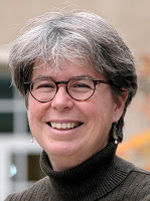When my mother was a graduate student in New Orleans in the mid-1950s, she wrote her mother every night. As I looked through a box of papers I’d found in the barn last summer, my father told me that he could never understand how she found so much to say every day.
As I read the exchange of letters collected in “Love and Salt” this summer, I wished that someday I might happen onto a box with my young mother’s correspondence in them. What was her journey from student to wife to mother like?
In the book, Amy Andrews and Jess Mesman Griffiths also meet in graduate school, and when a year later Amy decides to become Roman Catholic, she asks Jess to be her sponsor. During the Lent just before Andrews is received into the Church at Easter, she and Griffiths resolve to write each other every day.
Like my mother and hers, they found much to write about. “Love and Salt” lets us peer over Jess and Amy’s shoulders as they share their faith journey over three years. Inspired by a line from the Book of Ruth, “Wither thou goest, I will go. Thy God shall be my God,” they companion one another from one moment of conversion to another.
In “Seeking the Face of God,” William Mattia opens a window into what might seem like a very different sojourn, that of Msgr. Francis X. Meehan, a priest of the Archdiocese of Philadelphia.
Mattia has edited a series of short excerpts from Meehan’s writings, beginning when he was a young seminarian, roughly the same age as Jess and Amy, up to his death in July 2011.
Both books thread their way through the ordinary weals and woes of life, ever so gently pointing out that the path to God takes us through our most ordinary of days: “[T]he laundry in the bedroom is weighing on my mind, as are the towels in the bathroom, the dusty floors,” laments Amy to Jess on a February day, while Father Meehan exults in the blessings to be found in a prayerful cup of coffee on a sunwarmed deck overlooking the ocean.
Yet these experiences call each of them to grapple more deeply with the mystery of God at work. Facing the laundry and the dust pushes Amy to imagine the radical conversion experienced by saints who surrendered everything, even their own lives. Msgr. Meehan reminds himself that prayer permeates everything, the quotidian as well as the sacred.
As his final illness worsens, Msgr. Meehan grapples with facing his own death, pulling from the wisdom found in Dostoevsky’s Brother Karamazov and St. Therese of the Child Jesus. His honesty in the face of what he calls “the not-knowing” and his desire to be allowed to continue to pray and work for others even after death reminds me of an email he sent me when I first began writing for The Catholic Standard and Times. “Prayers for one another,” it closed.
Whatever else we are called to, we are always called to pray for one another, to recall that we are one in this Body of Christ.
When tearing grief enters Amy’s life, Jess finds the line from the Book of Ruth that drew them together to be a discomfiting challenge. How can she, a new mother, go where Amy is going as she grieves the death of her first born? When, in the words of Psalm 42, tears have become Amy’s bread and she cannot sense the presence of God.
Jess struggles to respond as the psalmist does, by listening to Amy, by being present to her pain. Amy responds, “Don’t stop praying.”
“Love changes everything,” notes Msgr. Meehan, quoting the former Father General of the Society of Jesus, Father Pedro Arrupe. Love — and an abiding joy in God — permeates both these books, even when the salty tears are all there are to drink on a page.
The communion of saints and the hope of the resurrection that we profess our belief in each Sunday come alive in each of these reflections. Love cannot change history or the inexorable path from this life to the next, but indeed it changes everything. Let us pray for one another, and then perhaps, write a letter to a friend.
***
Love and Salt: A Spiritual Friendship Shared in Letters. Amy Andrews & Jessica Mesman Griffith, Loyola Press, 2013
Monsignor Francis Meehan: Seeking the Face of God. Francis X. Meehan & William Mattia (editor). WestBow Press, 2012
***
Michelle Francl-Donnay is a member of Our Mother of Good Counsel Parish in Bryn Mawr. She also writes the blog Quantum Theology.
PREVIOUS: Praying to family members; rules for liturgical ministers
NEXT: Mass just too long? There are answers, and options




Share this story